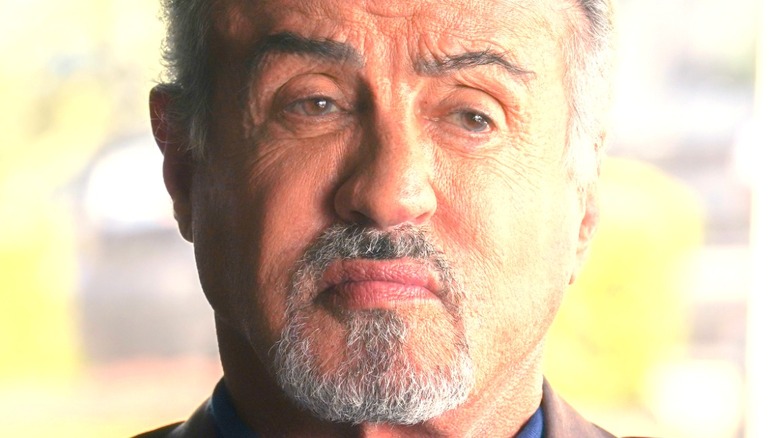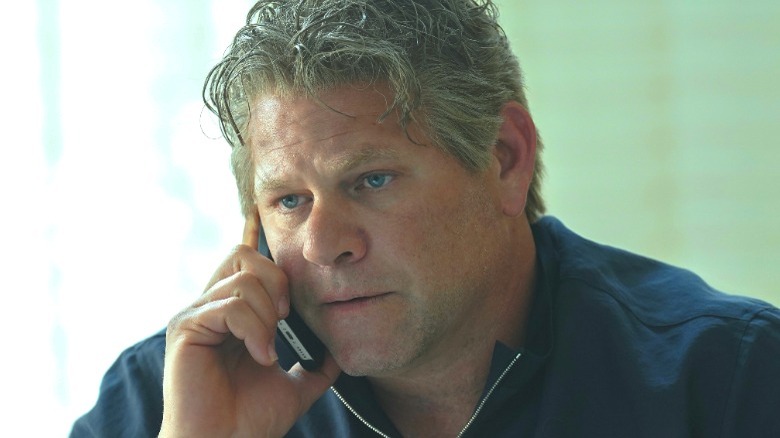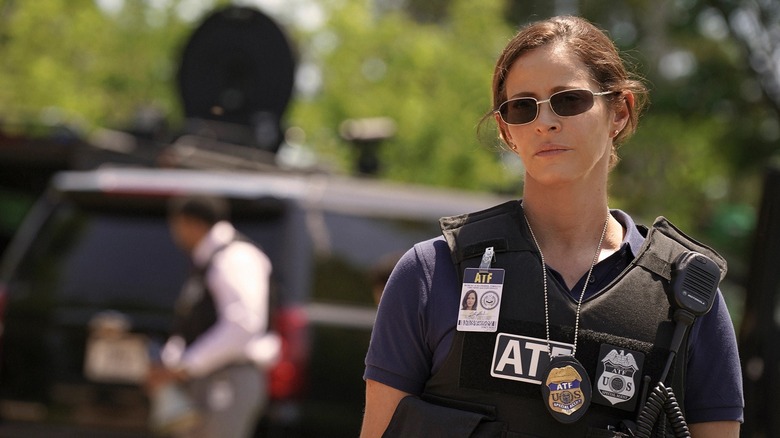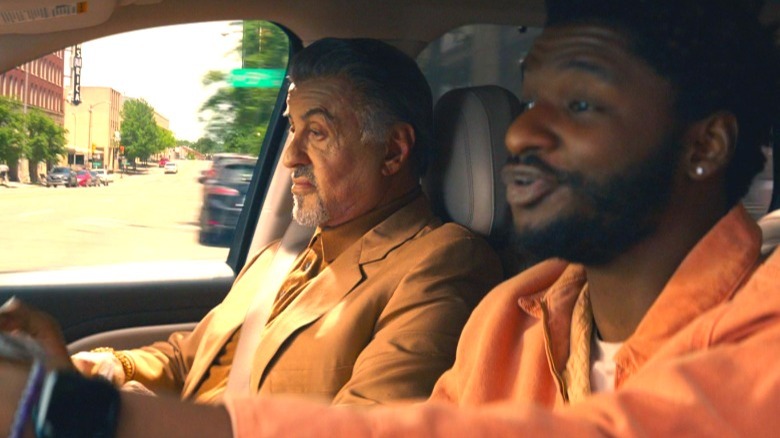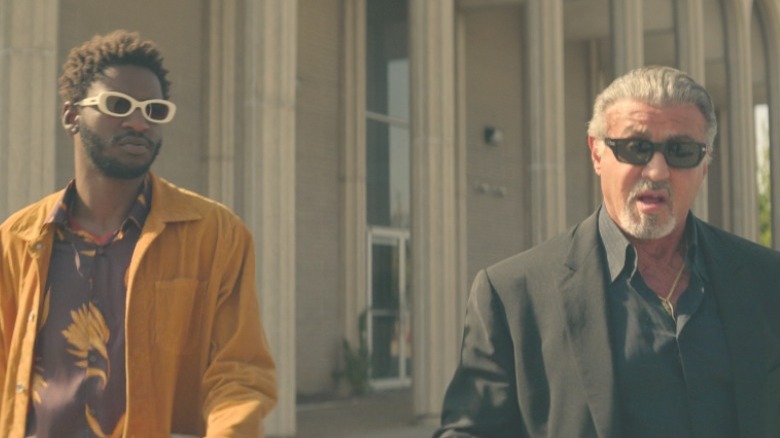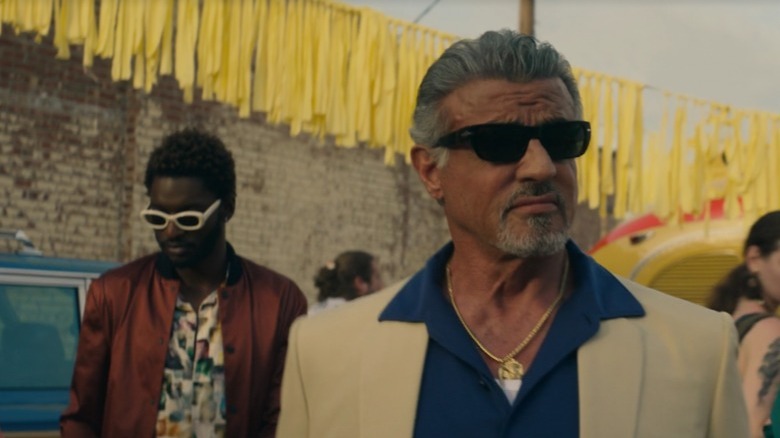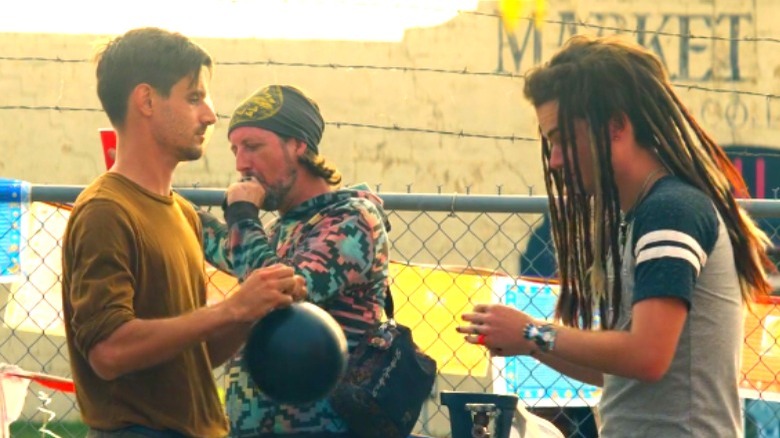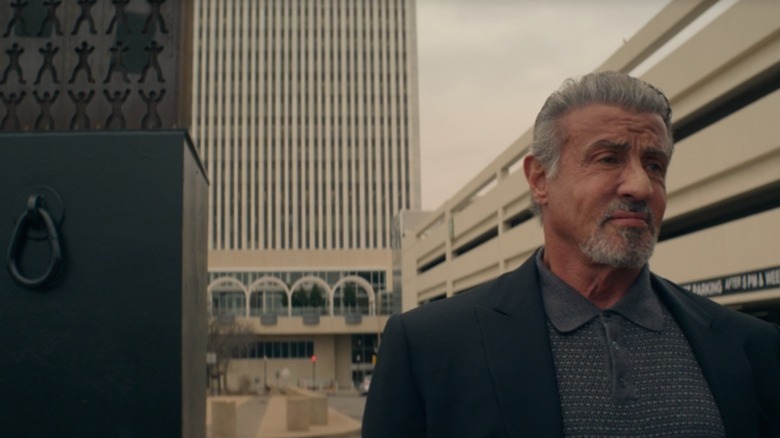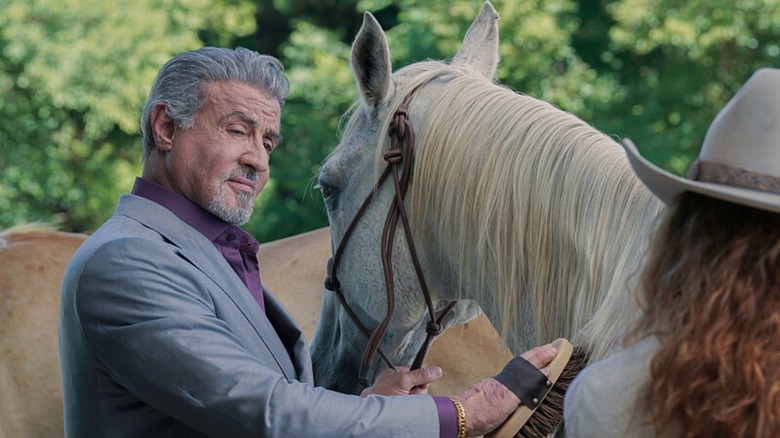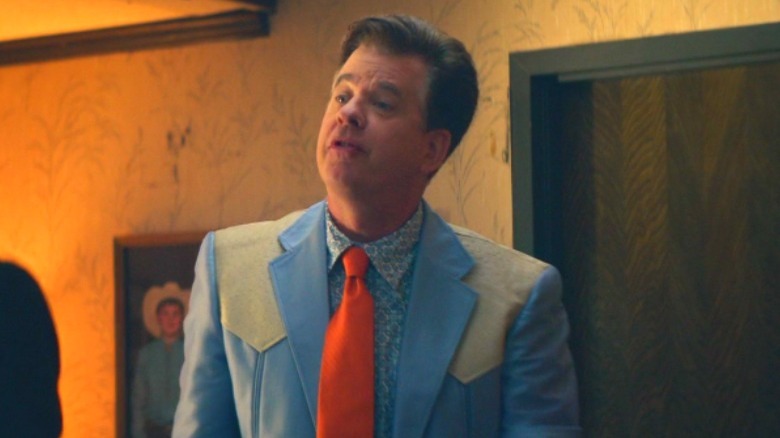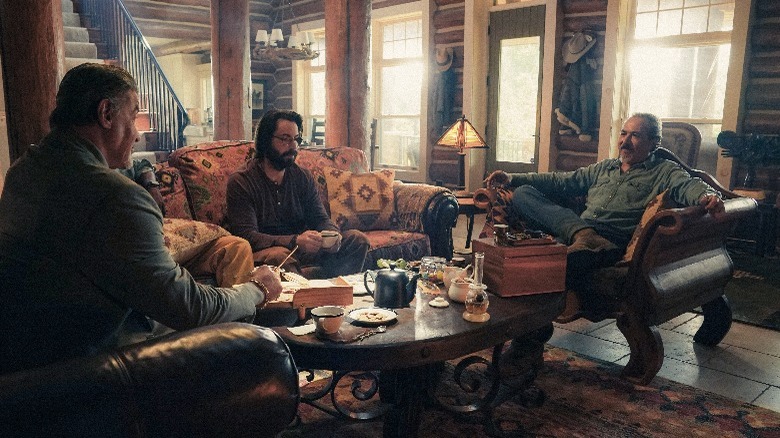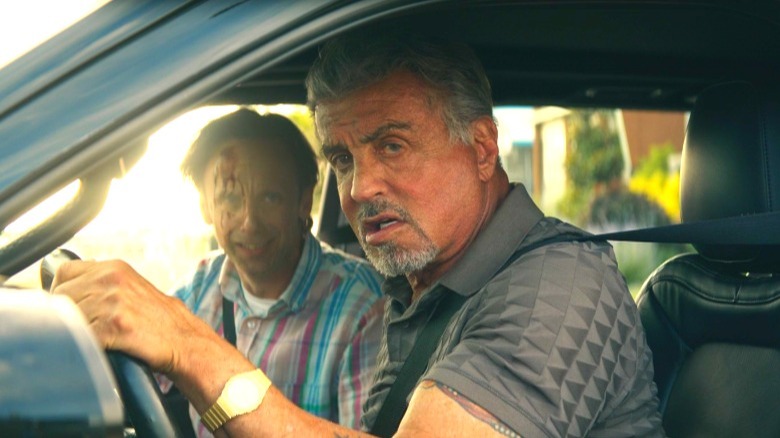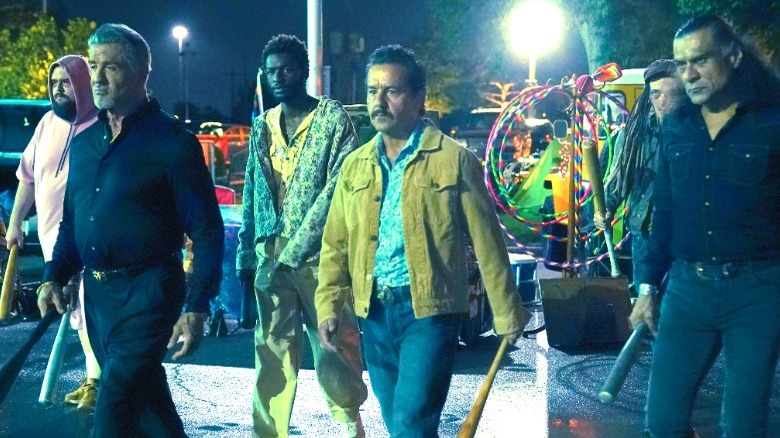Everything Tulsa King Gets Wrong About Tulsa
These days, Taylor Sheridan's dramas seem to be taking over television. He has expanded the popular "Yellowstone" universe with prequels like "1883" and "1923," and developed new stories like "Tulsa King," a fish-out-of-water tale centered around a septuagenarian mobster whose boss relocates him to the titular Midwestern city after a decades-long stint in the pen.
While the series has already picked up a following, many residents of the real Tulsa find the show's portrayal of their beloved city irksome at best and downright offensive at worst, missing the mark on everything from the city's landscape to its culture and style. Twitter user Lydia Fry aptly summed up Tulsans' frustrations when they vented, "Can @TulsaKing get a consultant of sorts from Tulsa? They're just getting so many things wrong."
There are plenty of things to love about the show, which features Sylvester Stallone as protagonist Dwight Manfredi, but the city it presents has little in common with the real boom town located in the heart of Tornado Alley. Before you invest in a new pair of Luccheses for your trip to the Sooner State, let's take a look at everything "Tulsa King" gets wrong about Tulsa. Spoilers ahead.
Organized crime isn't new to Tulsa
The central plot of "Tulsa King" revolves around the General's efforts to plant a mafia flag in T-Town, with the acting head of the Invernizzi crime family telling Dwight, "It's wide f****** open. It's the future. There's nobody doing nothing." While it might fit the plot of the series, the reality is very different. A place that sprang up as a frontier town and later blew up amid the oil boom of the 1920s (a heyday for outlaws, gangsters, and mafiosos thanks to Prohibition and the Great Depression), Tulsa has organized crime baked into its DNA. In fact, the conspiracy to kill the people of the Osage Nation was one of the nascent FBI's early investigations. Writing of the state in 1930, columnist J. Frank Dobie remarked, "The only genuinely interesting men that Oklahoma has produced have been Indians and outlaws."
Most Tulsans who have been around since the '80s can recall Tulsa's most notorious mob tale, the 1981 death of businessman Roger Wheeler. Wheeler was gunned down in a mob hit ordered by crime boss Whitey Bulger of the Winter Hill Gang, an organized crime syndicate based out of Boston. The hit, meant to stop Wheeler from revealing the crew's embezzlement scheme at his club, saw Wheeler executed after a round of golf at Southern Hills Country Club, a Tulsa golf course known for hosting the PGA on several occasions (via Tulsa World). And as recently as 2022, the FBI reported that Oklahoma law enforcement agencies assisted in a sweeping investigation resulting in 125 convictions among the Irish Mob Gang (IMG), an "Oklahoma-based prison gang" known for, among other things, trafficking drugs through the prison system and smuggling firearms into Mexico.
Tulsa isn't ATF Siberia
Sure, it's tough being a New York mobster all alone in the land of Oral Roberts, but at least the General meets someone he can relate to. Dwight's new friend-with-benefits Stacy Beale (Andrea Savage), an ATF agent from New York, has been relocated by her bosses to get her out of the way. When Manfredi asks her what she's doing in "Cow Patty, Oklahoma," she tells him that Tulsa is "one of the ATF's many versions of Siberia." But the reality is that Oklahoma's two ATF offices play a vital part in the agency's efforts to keep Americans safe.
The United States Bureau of Alcohol, Tobacco, Firearms and Explosives (known more commonly as the ATF) has dozens of offices, both internationally and throughout the United States. In 2020, the ATF recovered and traced 7,254 firearms in New York (population 8.8 million) compared to 3,434 in Oklahoma (population 3.9 million) during the same calendar year. In other words, Oklahoma ranks right up there with Stacy's hometown in terms of recovered guns per capita. According to Tulsa Police Sergeant Rusty Brown, Tulsa also has an active gang presence that includes the Universal Aryan Brotherhood, Sureno 13, Bloods, Neighborhood Crips, and Hoover Crips, among others.
It's worth noting that, before 9/11, the most deadly act of terrorism in the United States was the Alfred P. Murrah Federal Building bombing on April 19, 1995. Two right-wing extremists targeted the building housing the Oklahoma City ATF office and several other federal agencies with an explosive device. To many Oklahomans, the suggestion that the ATF would consider the Oklahoma field offices unimportant disrespects the 168 lives lost in that horrific act of violence.
The real Tulsa is much more cosmopolitan
"Tulsa King" presents an alternate-reality version of Tulsa that looks more like Topeka, Kansas than a bustling metropolis with a population of more than a million people. From the passenger seat of his Lincoln Navigator, Dwight enjoys a casual, traffic-free drive from the historic Mayo Hotel through astonishingly empty downtown streets and a city abundant with ranches, pastures, and rural green spaces. Unlike the Mayo Hotel of the series, the real Mayo is nowhere near any open fields. Visitors will find it planted squarely inside the city's central business district surrounded by high-rise buildings, including a half-scale copy of the World Trade Center towers designed by the same architect.
While the traffic tends to be manageable, an hour chasing red lights isn't unheard of, and you can expect heavy congestion when driving through downtown Tulsa on weekdays. And by night, the area transforms into a hub for nightlife packed with pedestrians, rickshaws, Ubers, and scooters. You're far more likely to find a hipster bar or a rockabilly hangout than a dumpy little country joint near the Mayo. Like many mid-sized cities, Tulsa boasts several unique districts, from the historic architecture of Lortondale to the Blue Dome Arts District. Manfredi is missing out entirely on East Tulsa, with its abundance of pho shops, international groceries, and Mexican and Central American food trucks. And he would be remiss if he didn't stop in Greenwood, the historic home of Tulsa's Black Wall Street that was tragically targeted during Tulsa's 1921 Race Massacre.
That's not what Tulsa looks like
It's fairly common for TV shows to be filmed in cities other than the ones they are set in for reasons related to production. Filming hotspots in Canada have served as stand-ins for plenty of locales, transforming into Boston for "Fringe" and Southern California for "Psych," among others. When this is done well, natives of the show's setting city might spot a few differences, but producers still manage to convey the general character of the city through atmospheric footage and other details — something that's woefully lacking in "Tulsa King."
Thanks in large part to a tax incentive, Oklahoma is quickly becoming a hotspot for movie and TV productions, spurring CBS to call the state's film industry "Hollywood on the prairie." Although "Tulsa King" shot a few key scenes in Tulsa, most of the filming took place in Oklahoma City, located about 100 miles southwest of Tulsa. While it makes sense to shoot the series near OKC's massive Prairie Surf Studios with its five soundstages, the Tulsa seen on screen has little of the charm and character that make Tulsa the city it is.
Unlike the flat, sparse prairie landscape seen in "Tulsa King," northeast Oklahoma — where Tulsa is located — is known for its lush woodlands, tall trees, and rolling hills, hence the local designation "Green Country." A few key postcard-worthy details that backdrop Tulsans' daily lives are touched on briefly in the "Tulsa King" intro but left out of the series almost entirely. Tulsa is globally renowned for its abundant Art Deco architecture, which graces everything from a high school to a fire department building. Also notably absent from "Tulsa King" is the city's retrofuturistic Jesus Town at Oral Roberts University and the many Native-run casinos found around the edges of the city.
That's not how Tulsa's dispensaries work
Like many U.S. states, Oklahoma historically had harsh penalties for cannabis possession. Oklahomans of a certain age can recall a time not so long ago when getting caught with a small amount could land them behind bars. All of that changed in 2018 when a referendum made Oklahoma the nation's 30th state to offer legal cannabis consumption for medicinal purposes, leading to a Statewide industry boom and making possession of small amounts a ticket offense. Frustratingly, the cannabis industry portrayed in "Tulsa King" looks almost nothing like reality.
The mayhem kicks off when the General encounters a divey cannabis dispensary populated by a staff of stereotypical stoners who are openly getting blazed while on the clock. Recognizing a business opportunity, Sly knocks out the dive's security guard and begins extorting the owner by pledging to protect the business from the frequent FBI raids apparently plaguing Oklahoma's dispensaries. To understand how utterly absurd this scenario is, one needs only to drive down any busy street in Tulsa. Once known for being populated with more churches than McDonald's, Tulsa's streets are now peppered with hundreds of dispensaries as well, and cannabis is a thriving but tightly regulated industry in Oklahoma.
Most stores are set up more like pharmacies than head shops, and you can't come in without a medical card. You won't find employees blazing up in the store, and the idea of a festival with folks getting boozed up and huffing nitrous in the parking lot is positively laughable to anyone who has been in an actual Tulsa dispensary. Most importantly, the feds don't just go around raiding dispensaries. When a rare FBI raid does occur, it's because something truly sinister is afoot.
Nitrous biker gangs are not a thing in Tulsa
Nitrous-hawking biker gangs are not a thing — at least, certainly not in Tulsa. While Tulsa does have its share of biker crime (one brawl between rival gangs in 2018 turned deadly), the shadier crews tend to dabble more in the traditional lines of biker gang revenue, like meth and guns. The idea that anyone would get away with selling nitrous balloons openly outside a dispensary or at an outdoor festival inside the city limits (as is seen in the show) for more than a few minutes before police intervened is highly unlikely for a few reasons.
Nitrous is more of a novelty than a high-demand drug. Although the Village Voice reported in 2010 about a nitrous-selling organized crime ring frequenting music festivals, the crew had to travel constantly from one festival to the next all over the country to make their paycheck. That's because nitrous isn't really that hard to get in cities the size of Tulsa, which the writers of "Tulsa King" don't seem to have taken into account.
That's not how Center of the Universe works
Every city in America has its own local quirks and Roadside America destinations. Tulsa is no exception, with its 75-foot Golden Driller overlooking the Expo Center, the Blue Whale of Catoosa, and the world's largest praying hands. No tour of Tulsa's oddball sights would be complete without a stop at the Center of the Universe, a weird little acoustical anomaly located on a pedestrian bridge next to the old train depot building.
When Dwight Manfredi happens upon the Center of the Universe, a local tells him, "Stand in that circle and nobody outside of it can hear a sound." When he asks her what he should say, she responds that she won't be able to hear it anyway. The scene left real Tulsans scratching their heads because it's simply not how the Center of the Universe works. While the Center of the Universe is an interesting phenomenon, using it to get your deepest, darkest secrets off your chest is a bad idea because others will definitely hear you.
Whether the person standing on the spot talks, shouts, or sings, the sound echoes back off the circular benches, creating an echo inside the circle. In other words, others will hear you, but it sounds a whole lot cooler from inside the circle. The echo chamber isn't even the best thing about this location — anyone visiting the spot would be remiss if they didn't take a moment to admire the 60-foot "Artificial Cloud" statue created by Bob Haozous, a Chiricahua Apache artist who created the piece in 1991 as a reminder of humanity's destructive impact on the Earth (via Tulsa People).
A horse downtown would not be considered normal
Of all the strange sights the General encounters in his new town, downtown Tulsa's resident equine is one of the most bizarre and most unlikely. It's true that there are plenty of horses around the Tulsa metro area, and — rarely — you can even find a few tucked away in little enclaves inside city limits. Occasionally, someone can be seen riding down Riverside or in a quieter area of town, and, like many cities, Tulsa law enforcement has its own mounted patrol division. But the idea that someone would just let a horse roam free around downtown sans rider is a fairly absurd one.
It would be extraordinarily rare to find a horse roaming around on its own within city limits, and this would usually mean that the creature has slipped through a damaged fence. Tulsa's downtown area has way too many cars for an unattended animal to traverse safely, let alone a riderless horse. If this were to happen, it would likely cause some serious traffic problems, and animal control would surely be called before the creature got injured.
That's not to say that Tulsa doesn't have its fair share of city critters. Situated on the Arkansas River and with plenty of lush green spaces, the city is home to skunks, possums, turtles, raccoons, foxes, armadillos, bats, barred owls, and bobcats. Coyotes are also sighted surprisingly frequently in T-Town. It's not unheard of to see one standing in the middle of a quiet street at night.
The country stereotypes have Tulsans rolling their eyes
Of all the things in "Tulsa King" that have actual Tulsans screaming, one of the most frustrating is the show's portrayal of the city's cowboy culture, first seen as Manfredi passes a group of cowboy hat-wearing Natives at the airport on his way into town. To real Tulsans, the city Manfredi finds himself in looks more like rural Texas or perhaps somewhere in the depths of the Oklahoma panhandle. Everywhere the General goes, he finds himself surrounded by cowboy-LARPing local yokels, like the car dealership owner who gives Tyson a hard time about purchasing a whip.
The most egregious example can be found when Dwight stops by the fictional Blue Dome Haberdashery to get his suits altered. As the tailor surveys Manfredi's duds, he comments, "Can I be honest with you? We're in Tulsa. How about something a little more modern? More in keeping with the local style." He then busts out a Western swing-inspired suit straight out of televangelist hell and suggests a Stetson hat and Lucchese boots to match. Vaquero fashion is fairly popular among some members of Tulsa's sizable Latinx community, but cowboy hats and Western suits are not the norm in Downtown Tulsa.
If anything, a businessman about town would be more likely to sport a high-quality suit with a slightly more casual look to it than you might see on Wall Street. Generally, even the most countryfied Tulsan look involves a nice pair of jeans, some comfortable boots, a well-worn baseball cap, and the pickup truck to match. And what about that super-twang country bar Bred 2 Buck? While Tulsa has had a handful of country dance halls through the years, they're more like themed nightclubs and frequented by as many non-country types looking to line dance as urban cowboys.
Native Americans are poorly represented
For many Tulsans, one of the most exciting things about the recent boom in Oklahoma film and TV productions is the potential for some good Native representation. Whether they're Indigenous or just living on tribal land, members of the Tulsa community have celebrated Native representation in "Reservation Dogs," which depicts the richness of Native experiences and culture in Oklahoma today. 38 Federally recognized tribal nations call Oklahoma home, and most of Tulsa falls under either Muscogee Creek Nation, Cherokee Nation, or Osage Nation jurisdiction. According to the 2017 U.S. Census, more than 7 percent of Tulsans identify as Native alone — that's more than 1 out of every 15 Tulsans.
This is why it's profoundly disappointing to see that the two Natives to get any amount of screen time in "Tulsa King" are a sketchy weed supplier named Jimmy the Creek (Glen Gould) and his bodyguard Bad Face (Jonathan Joss). For Tulsans, Natives aren't a stereotype or a side character. They're teachers, doctors, law enforcement officers, soccer moms, and ministers. If the producers of "Tulsa King" want to represent Oklahoma, they should actively work to hire Native actors from the Tulsa community. They should consider giving "Reservation Dogs" creator Sterlin Harjo a call to learn more about ways to incorporate Native experiences into the narrative.
A car chase and shootout wouldn't be that shocking
When Dwight's trip to Tulsa finds him crossing paths with his old frenemy Manny (Max Casella), the latter's efforts to keep Dwight away from his new life in the witness relocation program result in a car chase and shootout through Tulsa's implausibly quiet streets. The mayhem ensues when a masked Manny pulls up next to Dwight mid-driving test, firing into his vehicle before speeding off with a teed-off Manfredi in hot pursuit, much to the horror of the cowering DMV employee administering his exam. In the aftermath, the police bring Dwight in to take his statement, understandably concerned about his past mafia ties — until his ATF buddy Stacey shows up to get him off the hook, leaving one of the officers noticeably peeved.
While it wouldn't be surprising that Tulsa Police would be interested in a mafioso caught up in a midtown shootout, it's worth noting that gun violence and police chases are hardly out-of-the-ordinary for Tulsa, and it's hard to believe local police would protest federal involvement in light of Tulsa's high crime rates. Citing FBI data, CBS News reported Tulsa to be the 26th most dangerous U.S. city for violent crime in 2020. Although Tulsa is overall a very pleasant place to live, carjackings, high-speed police chases, and even deadly road rage incidents are unfortunate risks when it comes to living in the city.
The General would have been arrested or shot by now
Perhaps the most unbelievable thing about "Tulsa King" is exactly how long Manfredi gets away with his shenanigans in Tulsa without getting any bullet holes or jail time. Law enforcement in Tulsa may not be on the same level as some of America's biggest cities, but police officers take their jobs very seriously, a fact that should be abundantly clear to anyone who has seen them on A&E's "The First 48" or "Live PD." While few Tulsans would hesitate before calling the cops on someone roughing up a local business, there's a good chance Dwight wouldn't have lived long enough to see those red-and-blue lights pulling up.
Tulsa is a town where people take the second amendment very seriously and do not hesitate to protect themselves when they feel threatened. Tulsans have a well-earned reputation for friendliness, but "Tulsa King" seems to have mistaken friendly for docile. As "The Outsiders" author S.E. Hinton tweeted of the series, "This is Tulsa, man. Every other person has a gun in his pocket."
